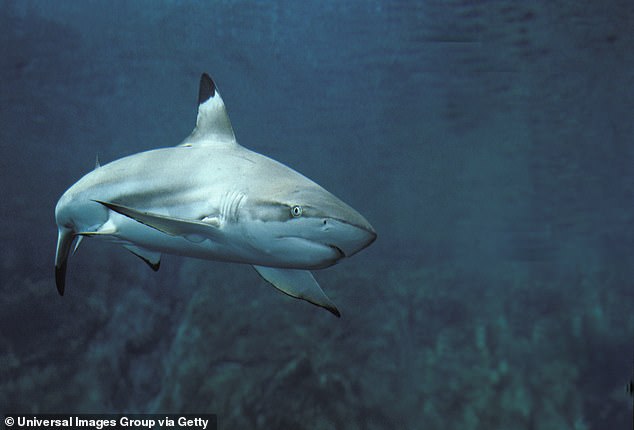Vacationer, 19, is mauled by shark in waist-deep waters off Texas coast – and reveals how she fought off the predator by punching it
A 19-year-old girl was attacked by a shark last month while vacationing with her family in Galveston, Texas.
Damiana Humphrey and her siblings were in waist-deep water when her sister-in-law said she saw something brown moving in the waves.
Humphrey said she turned around and “a shark grabbed my hand.”
“I looked down and there was a shark on my hand, so I think I started hitting it. That part is a little blurry to me,” she shared.
She said the shark, which was between four and six feet long, let go and swam away as she ran out of the water with her siblings.
Damiana Humphrey, 19, is escorted out of the ocean after a shark bit her hand. The bloody wound is visible as her family calls emergency services
Her family, who saw the severe bite, immediately called 911 and first responders arrived to transport Damiana to the hospital, where she immediately underwent surgery on her hand.
The shark severed four tendons, and while she is expected to make a full recovery, she will not be able to use her hand for several weeks, meaning she has had to give up her role as a patient care technician this summer.
Doctors have advised the teen that she will make a full recovery with physical therapy.
“Honestly, I’m just glad it wasn’t as bad as it could have been,” she said, adding that she’s also relieved her siblings weren’t bitten.
The area’s Beach Patrol Chief, Peter Davis, said Fox26 Houston that despite Humphrey’s terrifying experience, “it’s rare that we get shark bites here in Galveston.”
‘I’ve worked with a few in my career and the things I’ve seen were shark bites, not attacks. This means it was a case of mistaken identity, where they latched onto a human and swam away. It sounds like this is something like this,” he said.
Although shark attacks are rare, this does not mean that there are not significant numbers of sharks off the Texas coast.
Sportfish Center scientist at Texas A&M University, Dr. Kesley Banks, said a handful of shark species are common in numbers in the West Bay region.
“Especially outside of Texas, the most common species are blacktip sharks, spinner sharks and bull sharks. Around summer we see hammerhead sharks and tiger sharks. They are always there, she said.

Humphrey had been vacationing with her family at Galveston Beach from Oklahoma, where they live, when the shark attacked her in shallow waters.

The 19-year-old required immediate surgery to repair the wound, which severed four tendons in her hand

Doctors say she is expected to make a full recovery with physical therapy

Blacktip and spinner sharks sometimes turn a tan color, making it likely that it was one of those two species that bit Damiana. Pictured here: a blacktip shark

Humphrey has maintained a positive attitude after the meeting, but will be largely out of commission during the summer months
Blacktip and spinner sharks sometimes turn a tan color, making it likely that it was one of those two species that bit Damiana.
Banks said shark encounters tend to increase in the summer due to the increased number of people in the water.
Experts advise that to avoid a shark attack, people can use a few tips, including: shuffling your feet when walking in the ocean, and avoiding intersections between the ocean and other bodies of water, such as rivers, because there are usually many. of the fish that sharks hunt in those areas.
People should also avoid swimming around or near a school of fish, entering the water if they are bleeding, and if a shark bites you, you should fight it.
Humphrey did exactly the right thing when she punched her attacker. Landing a fist on a shark’s nose or gills can cause it to let go.
